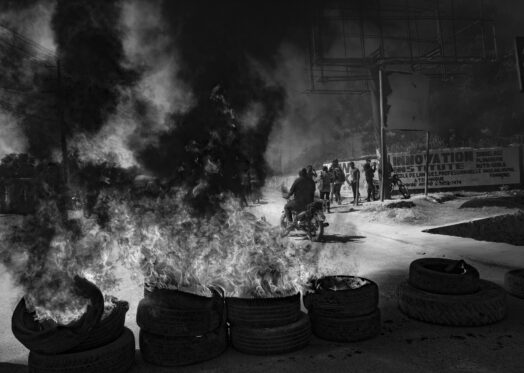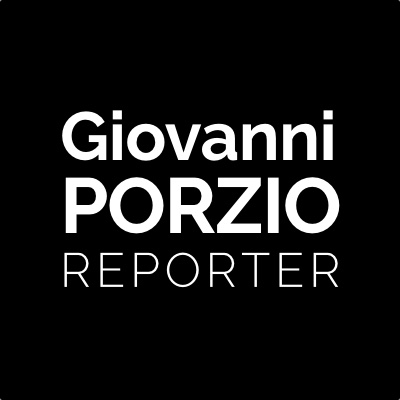A caribbean failed state

The sound of gunfire starts in the early morning and I spend a reckless day clung to the back seat of a shaky Chinese bike chasing riots all over the city. We aim at the smoke of burning tires, dodging barricades and overturned vehicles, flattening against walls to avoid stray bullets, confronting armed men with masked faces, bandits and rogue cops trying to storm the airport and the police stations.
At some point Yvon, my driver-fixer, slows down and gives me a sign. In the middle of the crossroad is a torched thing spreading whitish smoke around. “What’s the deal?” I think. “Another charred tire”. But the smell is not of rubber. So I look closer: it’s a man’s body burning, head and twisted limbs crackling in the fire. Nearby people are sipping beer, snickering and manning guns. “Must be a thief” says Yvon. “Or a guy trespassing in another gang’s territory. It happens a lot here”.
Armed groups linked to corrupt politicians and businessmen have always been a scourge in Haiti but since the assassination of president Jovenel Moïse in July 2021 they proliferated in the power vacuum and are now the de facto rulers of a country without head of state and without functioning institutions: the US-backed prime minister, Ariel Henry, is unelected and deeply unpopular.
Gangs kidnap ministers and common folk for ransom, extort protection payments from local businesses, street vendors and truck drivers. They ambush and gun down policemen and public officers. In Port-au-Prince gang bosses vying for control of territory impose their law in most neighborhoods, manage the port, the flow of goods and fuel, garrison the city’s access roads, the parliament, the courts. No wonder that many cops, randomly paid only $200 a month, choose to swap sides.
Most of the fighting in the capital is due to a bloody turf war between two gang federations, the “G9 and Family” led by former policeman Jimmy Chérizier “Barbecue” and the “G-PEP” led by Gabriel Jean-Pierre “Gabriel”. A galaxy of other groups, like the “400 Mawozo” or the “5 Segonn”, keeps a close eye on the streets and the murky business.
Meanwhile thousands of people fled warring neighborhoods and hundreds of schools have had to close. Cholera continues to rage. The central hospital is in shambles: there are no doctors or nurses, on strike for two months. MSF emergency wards are full of gunshot victims.
The filthy slum of Cité Soleil can only be reached by motorcycle, crossing lagoons of putrid sludge of contaminated black waters and mountains of knee-deep rubbish. There is no electricity, no drinking water, no sewage. The houses are flooded tin shacks churned out by bullets where women cook on charcoal and barefoot undernurished kids play with metal scraps in the rotting garbage.
Cité Soleil is a battleground. Since the gang fight erupted last year, more than 300 people were murdered in the district and at least 50 women and girls were raped. Jessica, 24 years old, has three children. The little one, Taisha, is only 4 months but her mother can’t breastfeed her. She’s too weak and has no milk. “My husband was killed in a crossfire six months ago. He never saw Taisha. Now I am left alone with my kids. I have no money and it’s hard to get food for them. Sometime I wash dishes near the food stalls and gain some gourdes. But it’s never enough”.
According to the UN, almost half of the 12 million Haitians are suffering from a “catastrophic” level of food insecurity and in Port-au-Prince alone around 20,000 people are facing famine-like conditions. But the international community pays little attention. The US and Europe are sucked into the Ukrainian conflict. Donors are rushing humanitarian aid and resources to Turkey and Syria after the devastating February 7 earthquake. Nobody will come to rescue a tiny Caribbean failed state.





